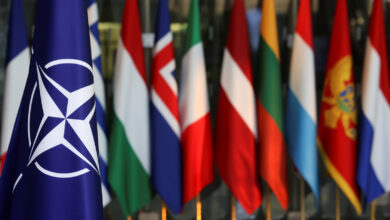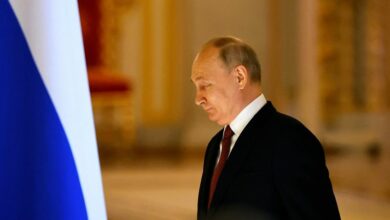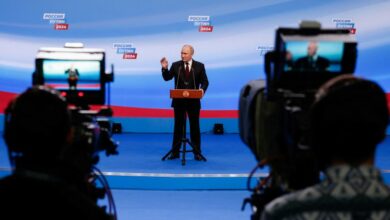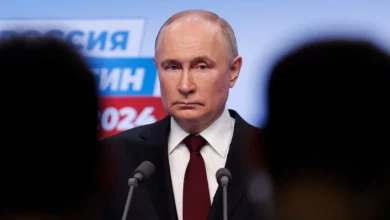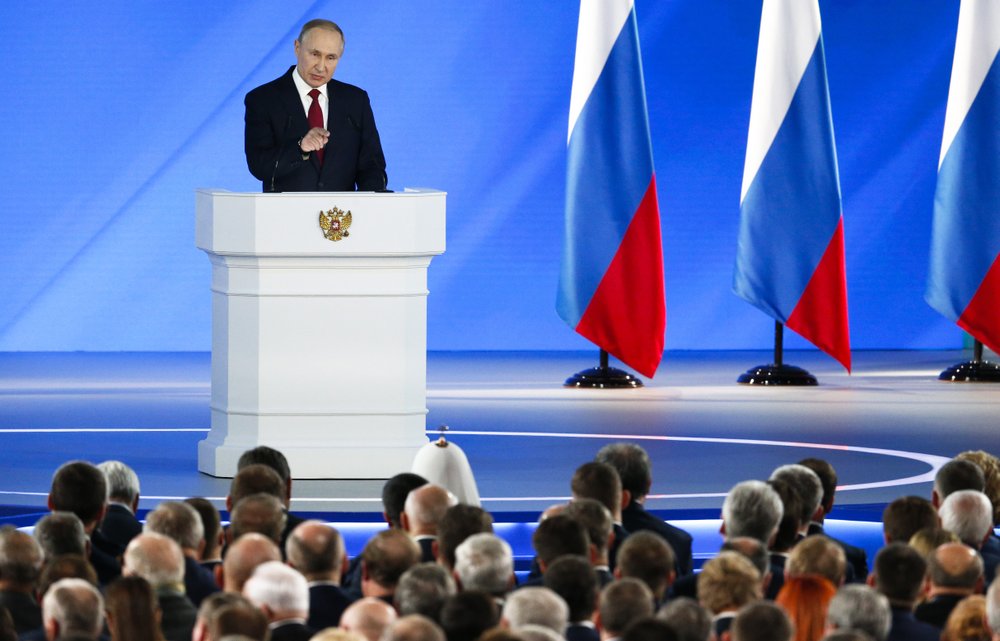
MOSCOW (AP) — President Vladimir Putin engineered a surprise shake-up of Russia’s leadership Wednesday, proposing changes to the constitution that could keep him in power well past the end of his term in 2024.
Hours after he made the proposals, Prime Minister Dmitry Medvedev resigned and Putin named the little-known head of Russia’s tax service to replace him.
Putin kept his longtime ally Medvedev in the Kremlin’s leadership structure by appointing him to the newly created post of deputy head of the presidential Security Council. But the duties and influence of that position are unclear.
The shakeup sent shock waves through Russia’s political elites who were left pondering what Putin’s intentions were and speculating about future Cabinet appointments.
Putin’s proposed constitutional reforms, announced in a state of the nation address, indicated he was working to carve out a new governing position for himself after his term ends, although the suggested changes don’t immediately specify what path he will take to stay in charge.
The 67-year-old former KGB operative, who has led Russia for more than 20 years, often keeps his intentions secret until the very last moment.
Alexei Navalny, the most prominent Russian opposition leader, tweeted that Putin’s speech clearly signaled his desire to continue calling the shots even after his presidential term ends.
“The only goal of Putin and his regime is to stay in charge for life, having the entire country as his personal asset and seizing its riches for himself and his friends,” Navalny said.
Independent analyst Masha Lipman told The Associated Press: “The goal is for the system to remain stable and for Putin to retain his grip on power and to remain what he has been throughout these 20 years — the most important politician in the country, the ultimate decision-maker, the uncontested unchallenged leader of no alternative.”
The Kremlin said Tax Service chief Mikhail Mishustin was nominated to replace Medvedev, who has been prime minister for nearly eight years. Approval by the Duma on Thursday is virtually certain.
Mishustin has no political experience, indicating he will dutifully carry out the Kremlin’s wishes as head of the Cabinet.
He is credited with modernizing Russia’s tax system. Analyst Gleb Pavlovsky, a former Putin adviser, told the Interfax news agency that Mishustin is “a splendid bureaucrat, in the best sense of the word.”
The move is the third time in the Putin era that major leadership changes have come suddenly from the top. Putin came to power in the first one, when he became acting president after Boris Yeltsin’s surprise resignation on New Year’s Eve 1999.
In 2007, as his second term neared its end, he anointed Medvedev to succeed him. Medvedev then said Putin should be prime minister — moves that critics decried as an imposed job-swap without input from the electorate. Medvedev was president in 2008-12, but Putin, as premier, appeared to be effectively in charge.
Under Medvedev, the constitution was amended to lengthen the president’s term from four years to six, although it limits the leader to two consecutive terms.
In televised comments Wednesday, Medvedev said he needed to resign in light of Putin’s proposed changes in government.
Putin suggested amending the constitution again to allow lawmakers to name prime ministers and Cabinet members. The president currently holds the authority to make those appointments.
“It will increase the role of parliament and parliamentary parties, powers and independence of the prime minister and all Cabinet members,” Putin told an audience of top officials and lawmakers.
At the same time, Putin argued that Russia would not remain stable if it were governed under a parliamentary system. The president should retain the right to dismiss the prime minister and Cabinet ministers, to name top defense and security officials, and to be in charge of the Russian military and law enforcement agencies, he said.
Putin emphasized that the constitutional changes must be put to a nationwide vote.
Putin has been in power longer than any other Russian or Soviet leader since Josef Stalin, who led from 1924 until his death in 1953. Under the current law, Putin must step down in 2024 after his term ends.
Observers speculated that Putin might try to stay in charge by shifting into the prime minister’s seat again after increasing the powers of parliament and the Cabinet and trimming presidential authority.
Political analyst Dmitry Oreshkin said Putin’s speech made it clear he was pondering the move to premiership.
“Putin is advancing the idea of keeping his authority as a more powerful and influential prime minister while the presidency will become more decorative,” Oreshkin said.
In his address, Putin said the constitution must also specify the authority of the State Council consisting of regional governors and top federal officials.
Tatiana Stanovaya of the Carnegie Moscow Center said it appears as if Putin might try to continue pulling the strings as head of the council and could even shift into a new position before his term ends.
Other possible options include a merger with neighboring Belarus that would create a new position of the head of a new unified state — a prospect that has been rejected by Belarusian President Alexander Lukashenko.
Political analyst Kirill Rogov said that Putin intends to stay in charge while redistributing powers between various branches of government.
“Such a model resembling the Chinese one would allow Putin to stay at the helm indefinitely while encouraging rivalry between potential successors,” Rogov observed.
In 2017, Chinese leader Xi Jinping had term limits abolished, which would effectively keep him in power for life. Putin appears to favor more intricate ways of staying in charge than abolishing term limits.
Although Putin continued calling the shots during Medvedev’s presidency, he wasn’t totally happy with all of his ally’s actions. He was particularly critical of Medvedev’s decision to give the green light to the Western air campaign in Libya in 2011 that led to the ouster and killing of long-time dictator Moammar Gadhafi.
Medvedev’s decision to step down and let Putin return to the presidency also sparked massive protests in Moscow in 2011-2012 in a major challenge to the Kremlin. Some of Putin’s associates suspected Medvedev’s aides of encouraging the protests.
In his speech, Putin emphasized the need to amend the constitution to give it a clear priority over international law.
“The requirements of international law and treaties and decisions of international organs can only be valid on the territory of Russia as long as they don’t restrict human rights and freedoms and don’t contradict the constitution,” he said.
He also said that the constitution must be tweaked to say that top government officials aren’t allowed to have foreign citizenship or residence permits.
Also in the speech, Putin vowed to encourage Russia’s population growth by offering additional subsidies to families that have children.
He said that Russia would remain open for cooperation with all countries while maintaining a strong defense capability to fend off potential threats.
“For the first time in history, we aren’t trying to catch up with anyone,” Putin said. “On the contrary, other leading nations are yet to develop the weapons that Russia already has.”
Reporting by Vladimir Isachenkov; Associated Press writers Jim Heintz and Kostya Manenkov in Moscow contributed.
Image: Russian President Vladimir Putin addresses the State Council in Moscow, Russia, Wednesday, Jan. 15, 2020. (AP Photo/Alexander Zemlianichenko, Pool)

